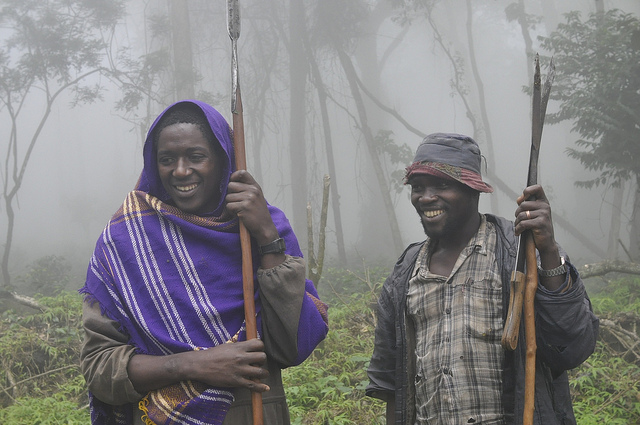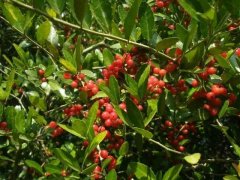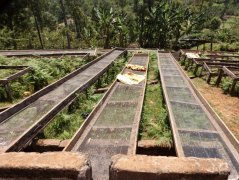Which brand of Kenyan coffee is good? Is Kenya AA the finest Kenyan coffee?

For professional baristas, please follow the coffee workshop (Wechat official account cafe_style)
Kenya AA Kenya AA-
Unique flavor
Kenya produces some of the most aromatic and acidity coffee in the world, and the local red soil is rich in aluminum and iron, creating a unique flavor of Kenyan coffee. It generally has unique black cherry fruit flavors such as fruit, spices, red wine, blackberries and grapefruit and biscuit roasted aromas without being too sour. The Body of Kenyan coffee is thick, with a hint of Yega Chuefei floral and orange flavor. The sour feeling of sipping the coffee liquid into the throat quickly turns sour to sweet, showing a different and very layered flavor.
Introduction of origin
Africa has always been one of the best coffee producing areas in the world, while Kenya is a country that pays great attention to coffee cultivation and quality management, close to Ethiopia, the origin of the world coffee. Whether local large coffee farms or small farmers, the vast majority of coffee beans after refining will be transported to the government-established Kenya Coffee Bureau (Coffee Board of Kenya, CBK) for cup testing and grading identification. Coffee beans are classified into seven grades: "PB", "AA", "AB", "C", "TT", "T" and "Buni" according to their size, shape and weight.
Planting history of producing area
Although Kenya is located in southern Ethiopia, the native place of Arabica coffee trees, it was not planted and produced in large quantities before the 19th century. Until 1893, Brazilian bourbon trees were brought back to Kenya to plant a large number of trees. Because Kenya is different from Brazil in climate, soil and water environment and treatment, Kenyan coffee trees have a new flavor. After that, Kenya gradually penetrated into coffee cultivation and quality management, and established the Kenyan Coffee Bureau and grading system in 1993.
Planting altitude
High-quality Kenyan coffee beans are generally planted at 1300-2100 meters above sea level. Due to the influence of high altitude, even during the day, the temperature will not exceed 27 degrees, and the low temperature will fall at about 15 degrees, so the growth rate is slow. The aromatic components of coffee beans can be fully developed.
FAQ grade is the general quality standard of Kenyan coffee beans, and the quality of raw beans is good, which is also the reference basis for origin and export.
Coffee grown in Kenya between 1700 and 2100 meters above sea level. 40 per cent of the acreage is on the slopes of the Kenyan mountains, while the other 20 per cent is between Nairobi and the Kenyan mountains.
Coffee is grown in red volcanic soil all over the country, thus creating the unique sour flavor of Kenyan coffee. Although it is geographically located in the equatorial belt, it is planted at high latitudes and the temperature is cool, giving the coffee tree enough time to grow and produce ripe and full fruit. The hard coffee beans have a mellow taste and a good balance between sour and sweet. 80% of the coffee varieties in this area are known as SL 28, which was developed in the early 20th century. This variety has a unique flavor, but it also faces competition from other varieties, such as RUIRU 11 or BATIAN. However, the flavor acidity of the latter two is on the high side, and the taste and flavor level are not obvious.
Important Notice :
前街咖啡 FrontStreet Coffee has moved to new addredd:
FrontStreet Coffee Address: 315,Donghua East Road,GuangZhou
Tel:020 38364473
- Prev

What is the meaning of Kenyan round bean coffee Kenya PB? Comparison of roasting flavor of Kenyan coffee
For the exchange of professional baristas, please follow the coffee workshop (Wechat official account cafe_style) product name Kenya round beans (Kenya PB) price HKD110/200g producing area / manor surrounding the mountains of Kenya (Mt.kenya, volcano) and Mount Mt.Elgon to produce the geographical environment above sea level 1400 1700 meters above sea level.
- Next

Kenya aa Coffee Africa Competition TOH Champion Kenya Raw Bean Flavor Competition Champion
For the exchange of professional baristas, please follow the coffee workshop (Wechat official account cafe_style) Kenya AA Fram Farm harvest season champion bidding batch Kenya TOH champion AA Fram Fram farm after the Ethiopian Sakuran and Uganda after the third African competition TOH champion, from Kenya's Qiyan Falls production area of the small farm, Fram, the bean seed is S
Related
- Detailed explanation of Jadeite planting Land in Panamanian Jadeite Manor introduction to the grading system of Jadeite competitive bidding, Red bid, Green bid and Rose Summer
- Story of Coffee planting in Brenka region of Costa Rica Stonehenge Manor anaerobic heavy honey treatment of flavor mouth
- What's on the barrel of Blue Mountain Coffee beans?
- Can American coffee also pull flowers? How to use hot American style to pull out a good-looking pattern?
- Can you make a cold extract with coffee beans? What is the right proportion for cold-extracted coffee formula?
- Indonesian PWN Gold Mandrine Coffee Origin Features Flavor How to Chong? Mandolin coffee is American.
- A brief introduction to the flavor characteristics of Brazilian yellow bourbon coffee beans
- What is the effect of different water quality on the flavor of cold-extracted coffee? What kind of water is best for brewing coffee?
- Why do you think of Rose Summer whenever you mention Panamanian coffee?
- Introduction to the characteristics of authentic blue mountain coffee bean producing areas? What is the CIB Coffee Authority in Jamaica?

